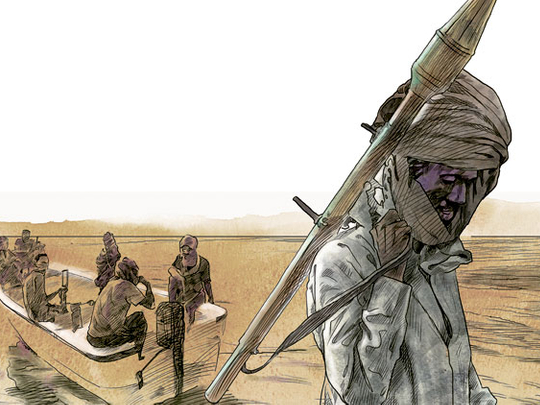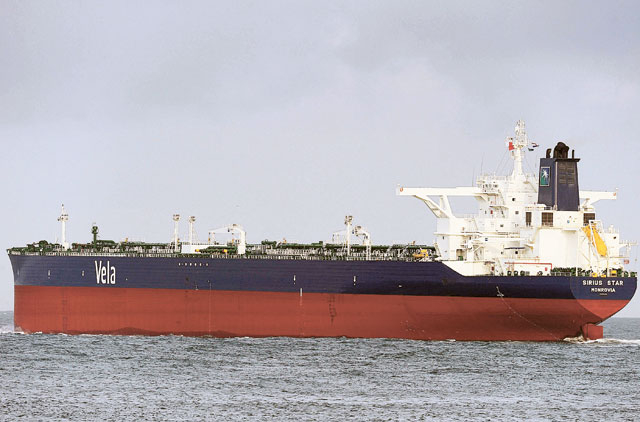
War. Famine. Lawlessness. Somalia, a failed state if ever there was one, seems blighted by fate. But in the past few years, especially since 2008, the issue of piracy off the coast of the Horn of Africa has ensured that the country constantly remains in the headlines, for all the wrong reasons. Since 1991, after the fall of brutal dictator Mohammad Siad Barre, Somalia has not had a functioning central government. There is no proper police force, let alone a navy to guard its more than 3,300 kilometre coast.
What originated as an attempt by some Somali fishermen to defend their nation's territorial waters against blatantly illegal fishing by unscrupulous trawlers from countries such as Taiwan has well and truly mutated into robbery on the high seas. As Jay Bahadur informs us in Deadly Waters: Inside the Hidden World of Somalia's Pirates, the pirates call themselves badaadinta badah or "saviours of the sea" — the coastguard, in other words. But ordinary Somalis see them for what they are: burcad badeed, which literally means "ocean robber".
Bored with writing tedious reports for a Chicago-based market research firm, Bahadur tried sending unanswered pitches to various editors and planning ways of getting his name in print. He then bought a ticket to Somalia and left the comfort of his hometown, Toronto.
In an interview with Weekend Review, he said: "Going to Somalia and trying to sell a book (before I had even had so much as a newspaper article published) was certainly an unusual way to go about becoming a journalist, but I had run out of ideas. Before piracy started making headlines in 2008, I had already intended to go to Somalia to cover the March 2009 election in [the self-declared republic of] Somaliland, by way of breaking into journalism; I was absolutely fascinated with Somaliland's homegrown democracy, and wanted to bring word of its success to international attention.
"With the daring hijacking of the Faina in September [2008], I was (along with many other people) caught up in the romanticism of modern-day pirates, these ex-fishermen braving the might of the world's navies with ageing Soviet weaponry and beaten-up fishing boats."
While researching his book, Bahadur spent weeks with pirates in Puntland, a self-governing region in northeastern Somalia. He reveals the details of the pirates' lives beyond the headlines: how they conduct business, spend their cash and why they risk their lives in often suicidal missions. In short, the book is an insider's account of the crisis of international piracy.
He busts the myth of the "lavish" lifestyles of pirates. They actually spend huge amounts of money holding the ships for weeks, sometimes months. Besides, most of these men have to share their spoils with destitute dependents. Add to that their phenomenal expenditure on the mild narcotic "qat", and the returns dwindle dramatically.
According to the International Maritime Bureau (IMB), as of August 9 there have been 176 attacks on vessels by suspected Somali pirates this year, which resulted in 22 successful hijackings, with 378 crew taken hostage. Taking into account those vessels hijacked in 2010 which remain unreleased, there are at present 20 vessels being held off Somalia with a total of 398 crew still held to ransom. The IMB says that pirates are using oceangoing fishing vessels to reach as far as the southern Red Sea, where they hijacked a chemical tanker in July 2010 — the first hijacking recorded in the area.
The organisation confirms what most observers already know: The pirates are now heavily armed with automatic weapons and rocket-propelled grenades.
In November 2008, in one of their most dramatic seizures, Somali pirates hijacked the Saudi supertanker Sirius Star, carrying 2 million barrels of crude oil worth $100 million (Dh367 million), in the Indian Ocean. The attack occurred nearly 800 kilometres south of Somalia, the farthest the pirates have ventured to date. They released the supertanker and its 25-strong crew after a ransom of about $3 million was reportedly paid on behalf of the ship's owners in January 2009.
The pirates had initially demanded more than $25 million. In November 2010, they set a record, receiving a ransom of $9.5 million to release the South Korean supertanker Samho Dream.
Most people don't realise that piracy is more a problem in Puntland than in Somalia proper — and that is ironic, given that Puntland actually has a functioning government. Bahadur agrees. "Yes, and what's also somewhat ironic is that Puntland's (semi-) functioning government is partially responsible for the rise of piracy in the region. Like any other business, piracy thrives in an ordered and predictable environment; the Puntland government provided that environment, yet never had the capability of extending the arm of the state into the coastal towns. For the pirates, it was really the best of both worlds."
A case can be made for the international community to recognise Somaliland, and even Puntland, as independent states. The idea that Somalia actually has a functioning federal government is, in any case, a farce. Bahadur believes that international agencies and foreign governments should start engaging with Puntland and Somaliland as official regional partners and provide them with direct financial aid.
"The United States government has already indicated that it recognises the wisdom of this approach, as earlier this year the State Department announced the adoption of a ‘dual track' approach to US foreign policy in Somalia."
But the fact remains that the US has played no small part in the incidents of piracy rising to the shocking levels they have. During the six months in which the Union of Islamic Courts was in power in Somalia in 2006, piracy was very much under control. For the first time in decades, the rule of law prevailed in Somalia. But America's obsession with the "war on terror" actually led to a rise in piracy. Washington fully supported Ethiopian dictator Meles Zenawi's wholly unprovoked invasion of Somalia. Anyone vaguely familiar with Horn of Africa politics will know that Somalia and Ethiopia are sworn enemies. Thousands of deaths later, predictably, the UIC regime was toppled, with the result that the more extreme factions went on to form the Al Shabaab militia, which has been linked to Al Qaida.
Bahadur noted that the "US government's focus on supporting the Transitional Federal Government based in Mogadishu, primarily as a bulwark against Al Shabaab and Al Qaida extremists operating from within Somalia, has had very negative consequences for the stability of Puntland.
One of the immediate triggers of the rise of piracy in Puntland was the fact that then-president Mohamamd Muse Hersi ran out of money to pay his security forces in early 2008. Considering that the Puntland government generally has a budget of about $20 million per year, it would not have taken much in the way of foreign assistance to help Muse's administration meet its payrolls."
It is naïve to assume that when governments claim no ransom will be paid to pirates in the Horn of Africa, they mean it. In most cases, what the governments actually mean is that they will turn a blind eye as shipping companies and pirates finalise their transactions. The bleak truth is that threat of withholding ransom payments is no longer credible and Somali piracy is unlikely to be completely eradicated in the near future.
As Bahadur said: "I have been criticised for focusing my prescriptions for a piracy solution on law enforcement and security, but I think that the ‘solution' many other commentators offer, namely ‘giving pirates jobs', or ‘re-building the Somali government' are extremely naive. People have been trying to rebuild Somalia for the past 20 years — it's not something that's going to happen overnight."
Shipping companies, meanwhile, continue to be in a bind. Bahadur said he would advise them to hire extra watches on deck. "These days, most commercial shipping vessels are critically undermanned, running on skeleton crews, and there's often only one officer keeping watch at a given time. However, the best way to deter a pirate attack is simply to spot the pirates coming; once they see they have been detected at a distance, the hijackers will often break off the chase immediately and look for easier prey. That said, shipping companies have incredibly tight budgets, and extra watches are a measure that may need to be brought in through binding IMO regulations — and that, of course, is a very long process."
Deadly Waters: Inside the Hidden World of Somalia's PiratesBy Jay Bahadur, Profile Books, 320 pages, £12.99
Flag states and the code
The International Maritime Bureau (IMB), whose responsibilities include fighting crimes related to maritime trade and transportation, particularly piracy and commercial fraud, has said that three of the largest "flag states" signed an agreement in Washington on August 3 condemning the acts of violence against seafarers by pirates. The three states — Panama, Liberia and the Marshall Islands — account for about 40 per cent of the world's commercial shipping tonnage.
For a commercial shipping vessel, a flag state is one under whose law the vessel is registered and licensed. At present, more than half the world's commercial shipping vessels do not fly the flag of their country of origin.
According to the IMB, the flag states have agreed to pool information on the mistreatment of seafarers at the hands of pirates. IMB director Pottengal Mukundan commented: "This new initiative will help to publicise the human cost of piracy, which at times can go unnoticed among reports of hijacking and huge ransoms. Current figures for 2011 suggest that the number of worldwide piratical incidents is on course to match or surpass those for 2010 — though, currently, attacks off Somalia account for a greater percentage of worldwide attacks than in previous years."
The policy of "flags of convenience" has attracted some controversy, as it provides shipowners with anonymity that can be misused — and it often is. Non-payment of wages and ill-treatment of sailors are common complaints. For the flag states themselves, it is often plainly about generating revenue. For instance, landlocked Mongolia also has one of the biggest registries of shipping vessels. But speaking to Weekend Review, Graeme Gibbon Brooks, managing director of the Southampton-based Dryad Maritime Intelligence Service Ltd, said that flag states too are bound by law. "I don't think there is a problem because the ISPFS Code [International Ship and Port Facility Security Code] is the deterring factor. And the flag [state] also issues its own guidelines to the shipping companies."













